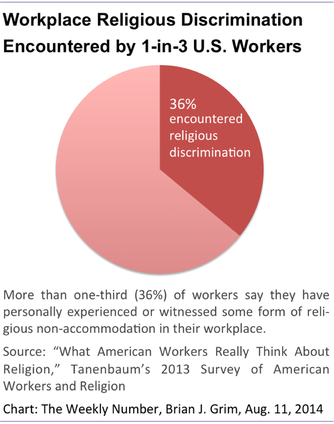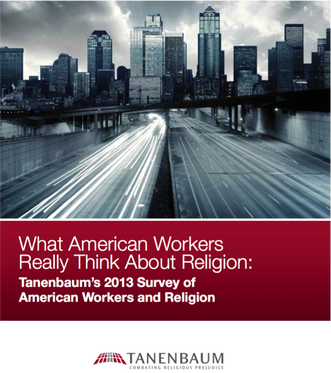36% of Americans — some 50 million people — report experiencing or witnessing workplace religious discrimination, according to a recent Tanenbaum survey, “What American Workers Really Think about Religion.”
Nearly half of non-Christian workers (49%) report experiencing or witnessing religious non-accomodation at work. White evangelical workers (48%) are equally as likely to report experiencing or witnessing religious non-accommodation at work. And two-in-five (40%) atheists also report experiencing or witnessing religious non-accomodation.
The survey notes that when it comes to addressing religion in the workplace, different religious groups have different needs for accommodation. For instance, a non-Christian may care more about the right to display a religious object or the right to pray during the day, while a Christian will be more concerned about attending service on Sunday. The survey found that the most commonly experienced or witnessed forms of religious non-accomadation are being required to work on Sabbath observances or religious holidays (24%) and attending company-sponsored events that did not include kosher, halal or vegetarian options (13%).
Less than half of all workers report that their companies have the following key policies related to religious diversity: 1) flexible work hours to permit religious observance or prayer (44%); 2) materials explaining the company’s policy on religious discrimination (42%); 3) a policy to allow employees to “swap holidays” (21%); and 4) programs to teach employees about religious diversity (14%).
The Tanenbaum survey found that 41% of workers at companies without clear processes for handling employee complaints – including religious discrimination complaints – say they are looking for a new job where they would be happier. This is nearly twice the rate as workers who say their companies do have clear processes (22%). Likewise, 32% of workers at companies without materials explaining the company’s policy on religious discrimination report that they are looking for a new job, significantly higher than workers at companies that offer these materials (25%).
Morale is higher in companies that provide flexible hours for religious observance. In such companies, 13% say that they do not look forward to coming to work, compared with 28% of workers at companies that do not provide this flexibility (13%) – more than a twofold difference.
Tanenbaum concluded from the survey that companies gain a competitive edge by adopting proactive policies of religious accommodation. Doing so makes good business sense, in that it increases employee morale and corporate reputation with regards to employee recruitment and retention.
OTHER FINDINGS OF INTEREST:
- The survey found that one-in-two U.S. workers have contact with people of different beliefs at work.
- Half of non-Christians say that their employers are ignoring their religious needs.
- More than half of American workers believe that there is a lot of discrimination against Muslims.
- Nearly 6-in-10 atheists believe that people look down on their beliefs, as do nearly one-third of white evangelical Protestants and non-Christian religious workers.
- Regardless of a company’s size, workers whose companies offer education programs about religious diversity and flexibility for religious practice report higher job satisfaction than workers in companies that do not offer such programs.
ABOUT THE SURVEY
Tanenbaum’s 2013 Survey of American Workers and Religion was conducted by Public Religion Research LLC among a random sample of 2,024 American adults (age 18 and up) who are currently employed in a part-time or full-time position and who are part of GfK’s Knowledge Panel. Interviews were conducted online in both English and Spanish between March 19 and April 1, 2013. The margin of sampling error is +/- 2.8 percentage points at the 95% level of confidence.
Tanenbaum is a secular, non-sectarian nonprofit that promotes mutual respect with practical programs that bridge religious difference and combat prejudice in schools, workplaces, health care settings and areas of armed conflict.


